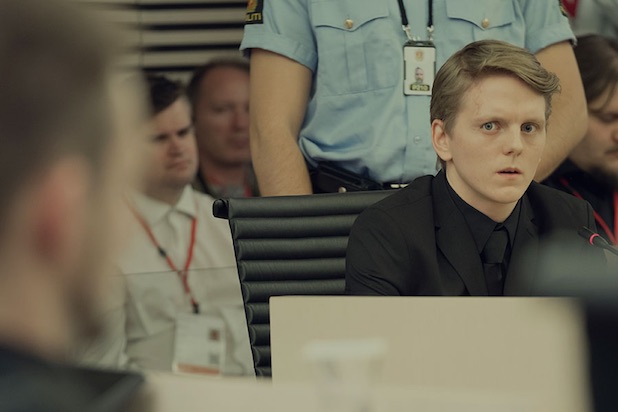Judy Woodruff: Our fall films series continues with a report on "22 July" about the events and aftermath of the deadliest attack in Norway since World War II. Jeffrey Brown has our look.
Jeffrey Brown: July 22, 2011, 32-year-old Norwegian Anders Breivik has set off a bomb at a government building in Oslo and now, posing as a policeman, prepares an even more gruesome act.
Actor: You heard about the bomb in the city?
Actress: Yes.
Actor: I have been sent to secure the island. Where's the ferry?
Actress: Oh, the ferry got canceled.
Actor: Get it over here. I need it now.
Jeffrey Brown: The film "22 July" is a dramatization of a real-life horror story, a right-wing fanatic's massacre of young people gathered on an island for a summer retreat. Seventy-seven were killed in the attacks, more than 200 wounded. They left a nation shocked to its core, and the world wondering where it might lead next.
Actor: This was an attack on our government and on our children. We are a long way from understanding why. But what is clear is that our nation has been attacked by someone who would see it changed.
Jeffrey Brown: British director Paul Greengrass ties it to a larger, ongoing rise of the extreme right in Europe and the U.S.
Paul Greengrass: I have got children. And I think that this is an issue that young people are going to have to resolve. They're going to have to choose how to respond to these immense forces and fight for the kinds of democracies that they want to live in. And, you know, these changes can be explored through journalism or history or documentary, but they also need to be explored through our cinema. It's very, very important, I think, that we don't close our eyes to what's going on in the world, and we don't close our cinema to it either.

Jeffrey Brown: Greengrass is widely known as a director of action-packed thrillers, including three of the Jason Bourne movies. He's also taken on recent political events that have shaken and shaped the world, such as his "United 93," about the September 11 attacks. Here, he gives us a gut-wrenching and up-close view of a man acting out his belief that Muslims and other outsiders, aided by liberal elites, are poisoning his society, and then the aftermath: an ideologue and inevitably a nation on trial. Greengrass says his first duty was to those personally impacted.
Paul Greengrass: The film that I wanted to make wasn't about the attacks themselves. It's about what happened afterwards. It's about how the people of Norway and the particular characters that we portray and the survivors of those attacks fought for their democracy. That's the story.
Jeffrey Brown: The film is based on the 2016 book by journalist Asne Seierstad titled "One of Us." She joined Greengrass for the screening at the Toronto International Film Festival.
Asne Seierstad: It speaks to your emotions and your heart, but also to your mind, because it's also a very intellectual film, in the sense that you actually do get to explore the mind of the mass murderer, the terrorist. And I think the audience is sitting and thinking, OK, is he mad or is he one of us?
Jeffrey Brown: In the film, as in real life, Breivik had his day in court. But the emphasis here is on the survivors, like 17-year-old Viljar Hanssen, played by Jonas Strand Gravli, who confronted Breivik at the trial.
Actress: Just say a few words, that's all.
Jonas Strand Gravli: And say what?
Actress: What happened. The truth.
Jonas Strand Gravli: That I cry in my sleep? That I can't talk to strangers? That I'm frightened of dying? I would rather not go than let him hear that.
Jeffrey Brown: In August 2012, Anders Breivik was judged to be sane and guilty of the mass murders. He will likely spend the rest of his life in prison.
Paul Greengrass: I came to the view that he was, as the court found, a political actor, a political extremist, a right-wing extremist. But the film has to show how the process of coming to terms with him was to explore the family background, you know, whether or not he was sane or psychotic.
Jeffrey Brown: One of the interesting things about this film and the trial itself, the actual story, is how much of a platform to give him.
Paul Greengrass: I definitely thought about how Norway faced that challenge, whether or not to give him a platform, was the correct one. They came to the view, in the legal process, that it was important that he be allowed to speak. If we close our minds and eyes to that, it's not going to go away. It'll get worse. We have to, and the democracies of the West have to win this battle of ideas. And we're only going to win that battle of ideas by acknowledging what the arguments are from the far-right side, what that worldview is.
Jeffrey Brown: "22 July" is available on Netflix, with a limited theatrical release as well. For the "PBS NewsHour," I'm Jeffrey Brown at the Toronto International Film Festival.











